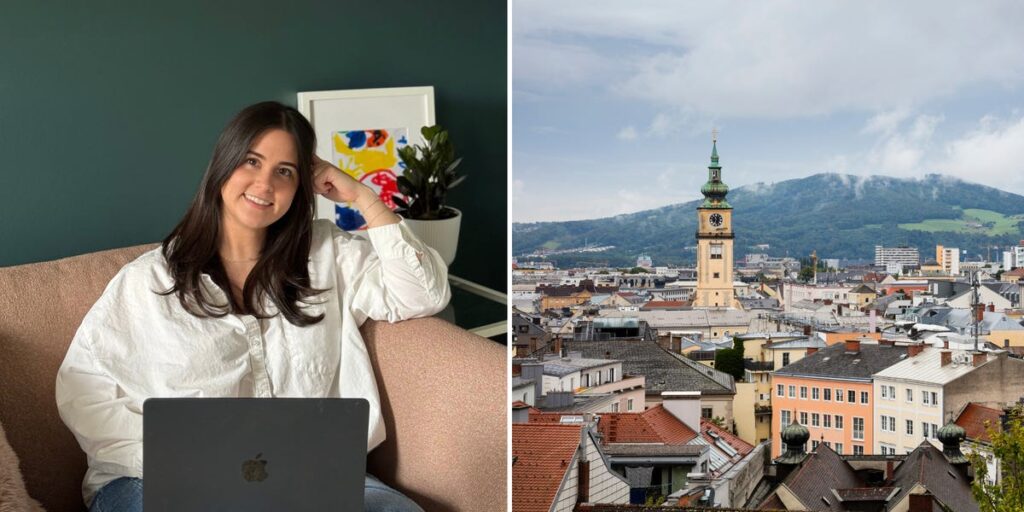This as-told-to essay is based on a transcribed conversation with 34-year-old Meghan Gezo, from Michigan. The following has been edited for length and clarity.
In 2022, I left my job working remotely in people operations for a US company. Juggling my job and raising my one-year-old wasn’t working.
I wanted to take a break while I looked for another opportunity that would allow me to have better work-life boundaries.
After a few months of job hunting, I started as a people experience manager at Storyblok, a fully remote content management company based in Austria.
I’d never worked for a company based in Europe before. Living in the US, most jobs that pop up are US-based.
People have come to expect more work-life balance in Europe, as the employment laws differ from the US. For me, there have been perks related to my life as a parent, my working hours, and my professional growth.
I was immediately drawn to the benefits of working for a European company
I’ve been working in remote jobs for tech companies since 2016.
I’d previously worked in an office, but thought a remote job meant I could focus on higher-impact work than the office administration that usually fell to HR, as well as branch out beyond the manufacturing and automotive industry jobs in my area.
It was easier to find a remote job in 2022 than in 2016. I found the listing for Storyblok on a job board. The people I spoke with were genuine and direct. In the first interview, they talked about time off norms and said the standard workweek is 38.5 hours. They seemed to emphasize work-life balance and gave me concrete examples of how it worked at the company.
I was optimistic I could be successful in the role while staying involved in my daughter’s life.
In the US, the norm on paper is a 40-hour workweek, but in practice, people often work until they finish their tasks, especially in tech. I used to work, feed my daughter, put her to bed, and then work some more. It felt normal.
At my current company, you focus on work when you’re at work and then log off until the next day. There have definitely been times when I’ve had to work extra hours, but overall, I’d say that my work-life balance is better.
In the US, it can often feel that your work is your identity. My European colleagues take pride in their work and are extremely hard workers, but their job is one facet of their identity.
Working for a European company has pushed me in new ways
I’ve gained experience working with people from other cultures. Learning about Austrian law has also pushed me to expand my HR knowledge beyond US employment law.
One thing I’ve noticed about the company culture is that when people are on vacation, they’re on vacation. Meanwhile, it’s more the norm in the US to answer messages on vacation. I’ve not completely broken this habit, but it has felt more attainable for me to delete work communication apps from my phone when I’m away.
I’ve felt very supported in my role as a parent at my European company
The Austrian norm of “care leave,” which isn’t a norm in the US, is a great part of working for a European company. Because I have kids under a certain age, I get to use two paid weeks off a year for days when my kids are sick and I need to take them to a doctor or take care of them. Having this bucket to pull from is a huge weight off my shoulders as a parent.
My previous employers had generous parental leave policies. However, at Storyblok, I got slightly more time — 16 weeks.
I went on maternity leave at a previous company with my firstborn and again at my current job in 2023. During my most recent maternity leave, people in the company treated it very seriously. I got a lot of support from my manager and team to help plan for my leave and assign my tasks to others.
During my first maternity leave for a previous company, I didn’t mind answering a few questions as needed to support my team, but at Storyblok, no one asked me work-related questions while I was away.
There are some downsides
While my working hours suit my season of life, there are days when I wish I could start later at 9 a.m. However, I don’t think I’d be as effective without overlap with my European colleagues. Right now, I work 6:30 a.m. to 2:30 p.m. ET.
Sometimes, if I have a question I want to ask colleagues in Europe during my afternoons, I’ll know that I won’t be getting an answer until the next day because of the time zone difference. I’ve learned to work these expectations into my regular workflow.
It does make me sad that I don’t live near my colleagues. I’ve built strong relationships with these people, but they’re an ocean away.
I’d find it hard to go back to a US-based company
Working for a European company didn’t occur to me as an option before I interviewed for this job. Having worked here for over two years, I feel spoiled by the benefits and perks of European working culture, and it would be hard for me to go back to working for a US-based company.
Do you have a story to share about remote work? Contact this reporter at ccheong@businessinsider.com
Read the full article here


